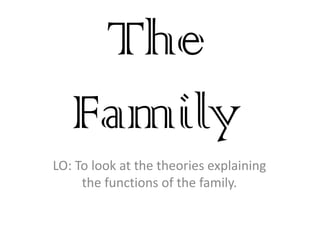
SociologyExchange.co.uk Shared Resource
- 1. The Family LO: To look at the theories explaining the functions of the family.
- 2. Recap! Hot – potato! We will recap Functionalism, Marxism and Feminism by playing hot-potato. If you receive the potato you must say a word, name or study associated to that theory.
- 3. To help . . . Write down as many words / phrases / studies / theories / sociologists as you can for the following; Marxism Functionalism Feminism You can work together but you’ll be on your own during the game . . . So don’t share all your knowledge.
- 5. Marxism
- 6. Feminism
- 7. Functionalism FUNCTIONS! Society = A biological organism. Society is based upon a value consensus.
- 8. What are the functions of the family? Primary Socialisation Economic Needs Reproduction Sex Murdock (1949)
- 9. But . . Could other institutions not perform these functions? Can only parents/siblings teach children the norms and values of society? Communes and other institutions can provide economic security. Women can use sperm donors for reproduction. Prostitutes can be used for sex.
- 10. Murdock see’s the family through ‘rose-tinted’ glasses. Functionalists ignore issues such as domestic violence and neglect. (The Darkside of the family)
- 11. Parsons Functional Fit Theory Families play different functions depending on the society in which they are in. Think of the different family types we looked at, especially in different cultures.
- 12. Pre-Industrial Society Parsons believed that in pre-industrial Britain, the most common family was the extended family. This is because the needs to the pre-industrial society required the extended family.
- 13. Industrial Society After Britain went through the industrial revolution, the needs of society changed. This caused the increase in the ‘nuclear family’.
- 14. Reasons for the change: Industrial society requires; A geographical mobile workforce. A socially mobile workforce.
- 15. Parsons Parson argues that families lost their ‘functions’ outlined by Murdock after the industrial revolution. Now families have just two functions: Primary Socialisation & Stabilising Adult Personalities.
- 16. Criticisms! The extended family was not dominant before the industrial revolution. Young and Willmott (1973) – it was nuclear! Laslett (1972) – Short life expectancy resulted in few extended family.
- 17. 2. Not all families became nuclear after the industrial revolution. Anderson (1980) found that working class families turned to the extended family due to illness, cost and childcare. Hareven (1999) found that the extended family was best equipped for the post-industrial society.
- 18. 3. According to Young and Willmott (1973) the rise of the nuclear family was due to better living standards, geographical mobility, better housing, women working and the welfare state. But the extended family is becoming increasingly popular in modern British society. Why do you think this is?
- 19. Split your A3 sheet into 3 sections. At the top of the page write the title Theories of the Family. As a sub-header in each section put the titles Functionalism, Marxism and Feminism. Activity